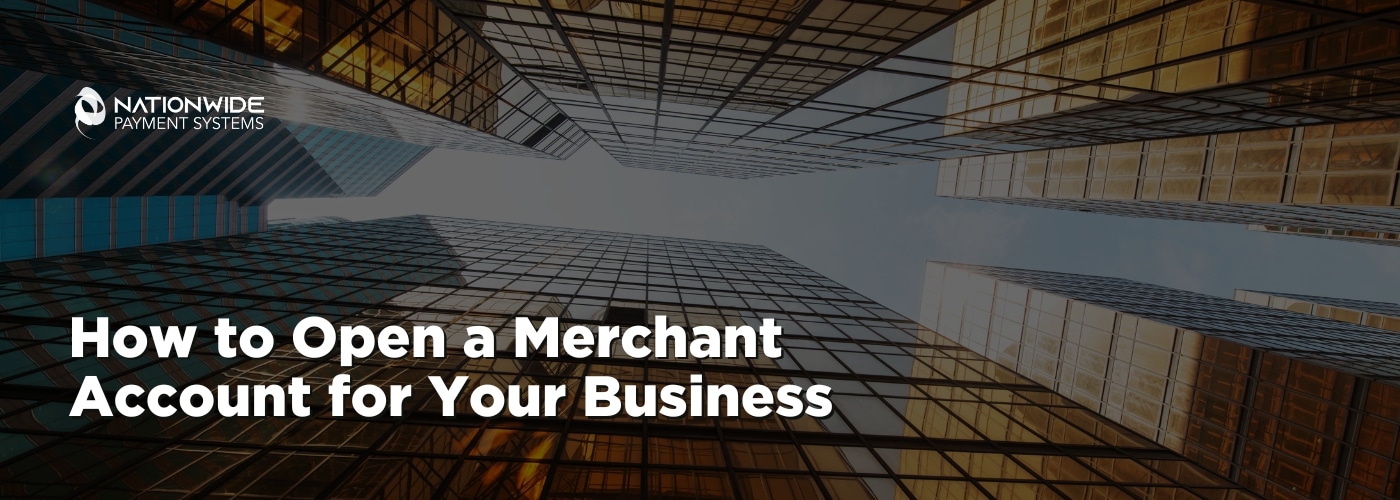How to Open a Merchant Account for Your Business
Nationwide Payment Systems, Fort Lauderdale FL
Opening a merchant account is a crucial step for any business looking to accept credit card payments. Whether you operate online, in-person, or via mobile, having a merchant account allows you to process transactions securely and efficiently. While it may seem like a complicated process, learning how to open a merchant account is straightforward once you understand the requirements. This guide will walk you through what you need to know and provide insights on how Nationwide Payment Systems can support your journey.
What Do You Need to Open a Merchant Account?
Before you open a merchant account, it’s essential to ensure your business is properly established and documented. First, gather the necessary paperwork to streamline the application process. Here is a checklist of the essential documents and requirements:
-
Legal Business Entity: Whether you are an LLC, corporation, or sole proprietor, you must show proof of legal formation. If you’re a sole proprietor, a DBA (Doing Business As) or Fictitious Name registration is usually required.
-
Business License: In addition, local or state business licenses may be required, especially if you’re in a regulated industry such as alcohol or tobacco sales.
-
Federal Tax ID Number: Also known as an EIN (Employer Identification Number), this is issued for free by the IRS and is used for tax purposes.
-
Business Bank Account: This is where your merchant funds will be deposited and fees will be deducted. A voided check or a bank letter is often required.
-
Domain Name and Registration: If you operate an online store, having a registered domain and active website is typically necessary before you can open a merchant account.
-
Processing Details: Be ready to share how you plan to accept payments—whether face-to-face, mobile, or e-commerce—as well as your average ticket size and monthly processing volume.
Understanding the Underwriting Process
When you apply to open a merchant account, the provider assumes a certain level of financial risk. That’s why underwriting matters. It’s a thorough vetting process designed to verify that your business is legitimate and responsibly managed.
During underwriting, merchant account providers will review:
-
Your business documentation
-
Your personal and business credit history
-
Your previous processing history, if applicable
-
Your chargeback history
However, if your business falls into a high-risk category—such as adult entertainment, travel, CBD, or financial services—you may need to submit additional documentation. While low credit doesn’t automatically disqualify you, it may affect your approval. That’s why working with a consulting-focused partner like Nationwide Payment Systems can be a huge advantage when trying to open a merchant account.
Proof That You Are an Official Business
Next, it’s important to show that you’re operating a verified and official business. This typically includes:
-
A state-registered LLC or Corporation
-
Required local and federal licenses
-
An EIN from the IRS (SS-4 Letter with a 9-digit number)
-
An active business bank account in good standing
Merchant providers will often cross-check your business licensing and use your EIN for tax reporting. Your business bank account must be functional and free of overdraft issues—these can be red flags during the review process.
What the Underwriting Team Looks For
Here’s a deeper look at what underwriting teams assess when you open a merchant account:
-
Personal Credit Score – While not always a dealbreaker, it is a factor.
-
Type of Business – Some industries are high-risk by nature.
-
Business Longevity – New businesses may be asked for more documentation.
-
Processing History – Especially important for high-volume merchants.
-
Chargeback History – Excessive chargebacks can be a warning sign.
Even if your business is new, a solid credit history and well-organized documentation can help move the approval process along smoothly.
Documents You May Be Asked to Provide
In addition to the basics, here are additional documents you may need to provide to open a merchant account:
-
Website Terms and Conditions
-
Return & Refund Policies
-
Shipping and Fulfillment Information
-
Product Images, Inventory Lists, or Supplier Invoices
-
Proof of customer guarantees or warranties
These materials help the provider assess your operations and verify your ability to fulfill orders and provide solid customer service.
What If You Are a High-Risk Business?
If you’re in a high-risk category, don’t worry—Nationwide Payment Systems specializes in helping businesses like yours open a merchant account. High-risk industries include:
-
Adult entertainment
-
Nutraceuticals and supplements
-
CBD, hemp, and cannabis-related products (CRBs)
-
Travel and hospitality
-
Financial services
-
E-commerce with subscriptions
These industries are considered high-risk due to chargeback potential or regulatory complexity. Because of this, providers often request:
-
Bank statements from the last 3–6 months
-
Personal and business tax returns
-
Detailed business plans or marketing strategies
-
PCI compliance documentation
Nationwide Payment Systems acts as your advocate, matching you with processors who understand your business model.
How Long Does It Take to Open a Merchant Account?
The timeline varies, depending on your business and risk level:
-
Standard Applications: For low-risk businesses with clean documents, approvals can happen in 24–48 hours.
-
High-Risk or Complex Applications: These can take a few days to a week, due to extra scrutiny.
-
Automated Approvals: Some systems allow you to open a merchant account in under 5 minutes, particularly for low-risk ventures.
To speed things up, be prompt and organized. Submit documents upfront, respond to follow-ups quickly, and ensure your website is live and functional.
Understanding Processing Limits and Volume Projections
Once approved, your merchant account will likely have a volume cap, based on:
-
Your projected monthly sales
-
Average and high-ticket transaction sizes
-
Your industry’s risk rating
For example, if you project $20,000/month in volume, your limit may be set at that level initially. Over time, and with consistent performance, you can request an increase. However, exceeding your limit without approval can trigger a review.
How Much Does Credit Card Processing Cost?
Finally, processing costs depend on several factors:
-
Industry type
-
Monthly processing volume
-
Average transaction size
-
Business risk profile
At Nationwide Payment Systems, we tailor pricing to your needs—whether it’s flat-rate, interchange-plus, or dual pricing. Our clients benefit from advanced tech, fraud prevention tools, and custom reporting for maximum efficiency.
Ready to Open a Merchant Account?
With over 20 years of experience, Nationwide Payment Systems has helped thousands of businesses open a merchant account and scale with the right solutions. Whether you’re starting fresh or transitioning from another processor, our consulting-based approach ensures you get the best fit for your goals.
CLICK HERE TO FIND MORE ABOUT OUR PROGRAMS
FAQ: Frequently Asked Questions
What is a merchant account and why do I need one?
A merchant account is a type of bank account that allows businesses to accept credit card and
debit card payments. It is essential for processing transactions and getting paid securely and
efficiently.
Can I open a merchant account if I have bad credit?
Can I open a merchant account if I have bad credit?
Yes, it is possible. While credit is a factor, it is not the only one. If your business has strong
financials or you operate in a low-risk industry, you may still qualify. High-risk businesses can
work with specialized providers.
What is considered a high-risk business?
High-risk businesses typically operate in industries with high chargeback rates, legal regulations,
or international transactions. Examples include CBD, travel, adult content, and financial services.
How soon can I start processing payments after approval?
You can begin processing payments as soon as your account is approved, and your payment
gateway is set up. For many businesses, this happens within 1–2 days.
What are chargebacks, and how can I prevent them?
A chargeback occurs when a customer disputes a transaction. You can prevent them by offering
clear policies, good customer service, and using fraud detection tools. Nationwide Payment
Systems also provides guidance on reducing chargebacks







